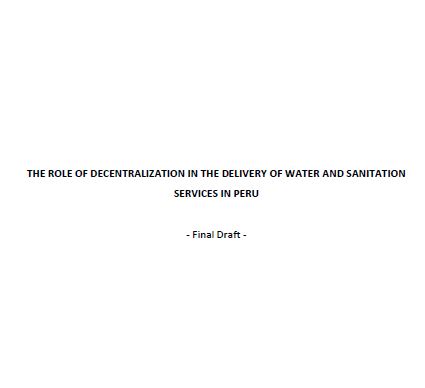The role Decentralization and the delivery of water and sanitation services in Peru
In order to reach the Sustainable Development Goal (SDG) Number 6, namely, to “ensure availability and sustainable management of water and sanitation for all”, Peru, like many other countries, has put into practice different strategies to improve the delivery of water and sanitation services. In 2006, the new President, Alan García, announced an ambitious investment plan for the water and sanitation sector called “Water for Everyone” (PAPT, Programa Agua para Todos). It promised water access to all Peruvians – and mainly to the poorest – by the end of his mandate. In the next period of government, from 2011 to 2016, President Ollanta Humala introduced a strategy called “Social Inclusion” to deliver basic services to the poorest population. The strategy incorporated access to water and sanitation services, among others, especially in rural areas. Finally, current President Pedro Pablo Kuczynski has recently pushed a new reform that seeks to provide access to water to almost all the population by the year 2021. This would be done by increasing provider efficiency. However, there is still a lot of work ahead to achieve improved public service delivery performance in Peru. The World Bank recognizes that public sector system strengthening can be more readily achieved by understanding the development context of a country or a specific sector. This can be done by identifying binding constraints and working around them. In this context, the World Bank Global Solutions Group on Water Supply and Sanitation (WSS) intends to explore regional experiences in addressing formal and informal dynamics of WSS service delivery incentives, including regulation, financial instruments, decentralization, fiscal transfers, and the role of civil society. The aim is to identify common institutional, policy and regulatory incentive trends/challenges in multiple WSS sectors in several Latin American countries, including Peru. Therefore, the objective of this work is to provide an in-depth analysis of the role and impact of decentralization and decentralized governance structures in the delivery of WSS services in Peru. The country study on decentralization seeks to present the sector trends and institutional context for WSS services. It also seeks to identify the main underlying constraints that lead to weak service delivery outcomes. This type of case study ought to provide useful information to policymakers and development practitioners to identify the main structural problems in the delivery of WSS services. This is especially the case in designing specific reform programs. In Peru, there are several issues related to the local provision of water and sanitation services. This research will contribute to identify which of them are associated with the decentralization scheme. This represents a very valuable effort, especially in a country where millions of people lack access to water and sanitation services. Indeed, the country is still far from reaching the sustainable management of such services.
